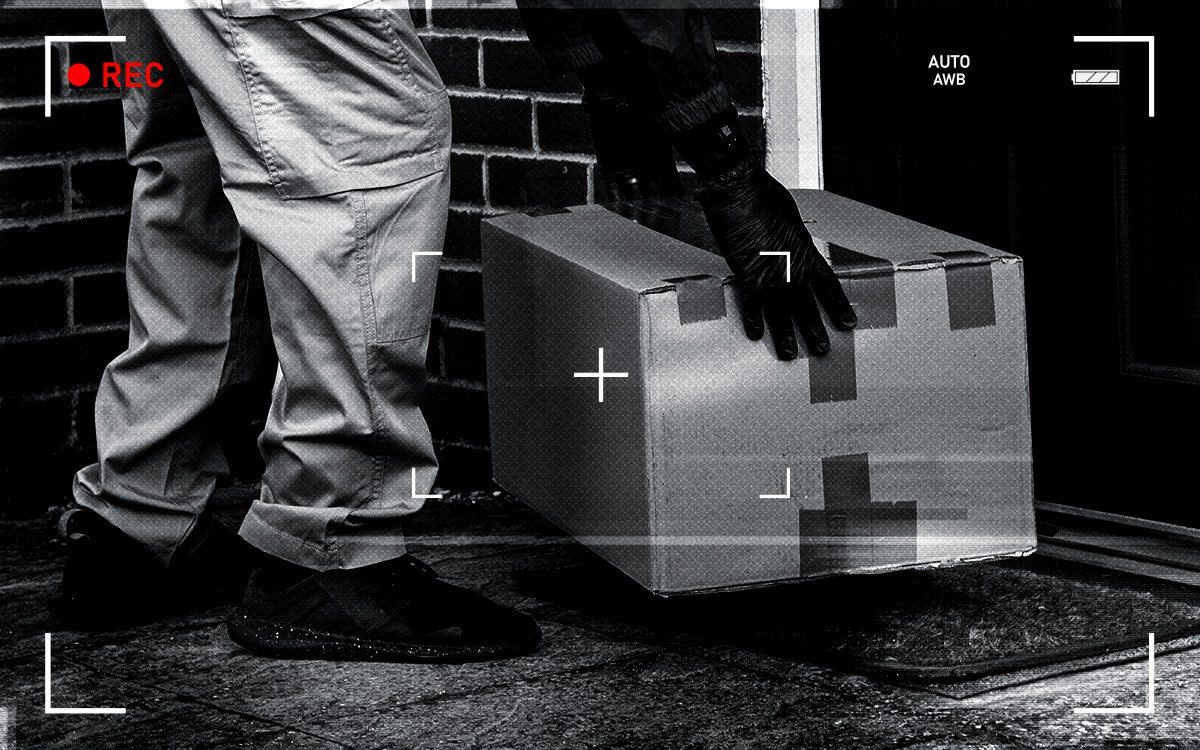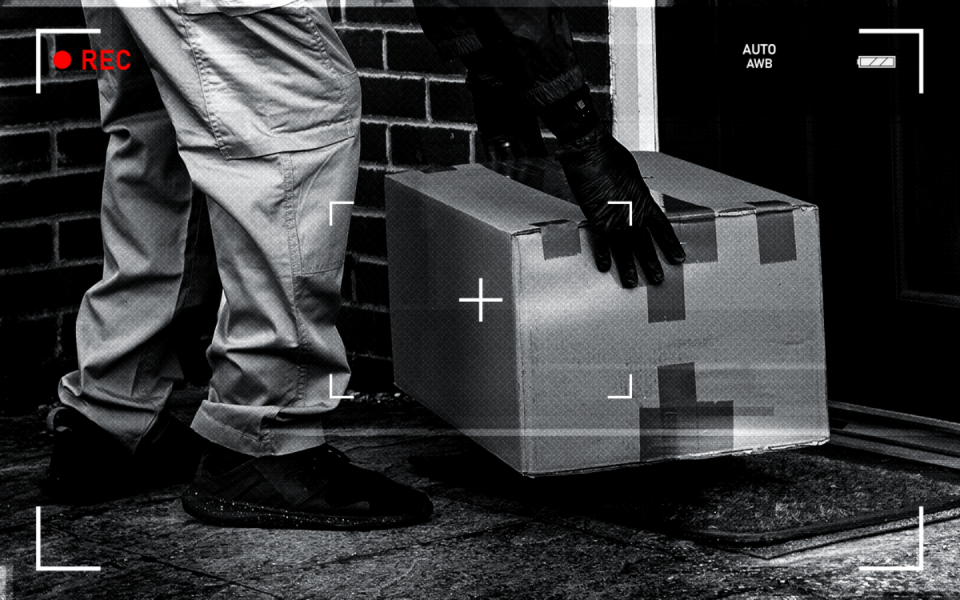The doorstep crime wave: why your packages are actually disappearing

- Oops!Something went wrong.Please try again later.

The first time, it was some footwear that mysteriously vanished. I had ordered it online, received a message specifying which parcel delivery firm had the honour, then another a few days later informing me that my item had been “delivered”. Fortunately, I was at home to intercept the package. Except that when I opened the front door – minutes after hearing the glad tidings of its arrival – there was nothing there.
“They didn’t even ring the bell!” I screamed at nobody.
A sloppy delivery, yes, presumably by a courier with another hundred to get through that afternoon. But it seemed I had been the victim not of the courier, but of a doorstep parcel thief. There was, after all, photographic proof of the parcel being left on my doorstep minutes earlier.
In vain, I scoured my suburban street in case the thief had opened the box, realised the shoes weren’t his size and jettisoned them in a hedge. He had not.
My plight is not uncommon. Recent freedom of information requests to British police forces by Quadient, a technology company, found parcel theft had risen by 57 per cent in the past year, with the average reported value of a stolen parcel £66.50. It was estimated that some 16,421 porch thefts occurred in the 12 months to August 2023 (extrapolating from the figures provided by forces that replied to the requests for information). This was compared to the 10,485 estimated to have been reported in the previous 12-month period.
Cambridgeshire had the highest total value of reported thefts (£33.729), closely followed by Northumbria (£33.408). But this is likely to be due to better reporting and recording of the crime, rather than because these areas are necessarily the country’s porch piracy hotspots.
Either way, the data uncovers a hidden economy worth £206 million in stolen goods, according to Quadient. Now, as we begin our Christmas shopping in earnest, online deliveries will hit their annual peak. And as more packages arrive, more opportunities for thieves to intercept them arise.
“About a quarter of [doorstep thefts] happen between November and December,” says Gary Winter, vice president of global strategic initiatives at Quadient. “We know a lot of it is stolen for resale, not personal consumption.”
Not all packages are of equal interest to so-called “porch pirates”, however. What they look for in particular is sportswear and athleisure-wear, says Winter, who has formerly worked for two delivery firms.
“When I worked at one of the carriers we used to monitor [it], and if you were a sportswear company or athleisure company, you were two or three times more likely [to see your delivered items stolen].
“A lot of these brands are very proud to have their logo emblazoned on the side of packaging. But you may as well print ‘steal me’ as it makes it obvious what’s inside.”
The appeal of sportswear lies in how easily it can be sold on online, he says, with the big consumer-to-consumer platforms such as eBay and Facebook inadvertently providing marketplaces for such trade. “If you buy a pair of trainers [on sites like these] where it says ‘unworn’, there’s a chance they were stolen,” says Winter.
As the goods are sold at less than the recommended retail price, they seem like a bargain to the unwitting customer. “It’s very tempting,” says Winter. “[But in buying them] you could inadvertently be fuelling these crimes.”
While the UK isn’t the only place with a porch piracy problem, the crime appears to be growing faster here than anywhere else. A report on global parcel theft by the firm Penn Elcom suggested more than 8 million packages were lost or stolen in the UK from May 2021 to April 2022. This was a rise of more than 5 per cent compared to the previous year – the greatest increase in parcel problems worldwide.
Of all UK regions, Wales was found to have suffered the largest rise in parcel theft compared to the previous year.
The far higher figures than Quadient’s are explained by the fact that the scale of the problem is underrepresented by police reports, since consumers are likely to report the theft only to the retailer or delivery firm, rather than the police.
It’s a crime born of modern lifestyles, the explosion in online shopping providing new opportunities for thieves. While it was assumed porch piracy would start to decline as we left the pandemic and returned to the shops, this has not been the case. Online shopping soared during Covid, of course; but unlike with mask-wearing or obsessive hand-sanitising, we didn’t lose the habit afterwards. While Office for National Statistics data shows that UK internet sales as a percentage of total retail sales spiked around the third lockdown in January 2021, at almost 38 per cent, it has never slipped back down to pre-pandemic levels (20 per cent in January 2020). Last month, online purchases still accounted for more than a quarter of all retail sales. Meanwhile, parcel theft has risen nationwide by more than 500 per cent since 2019, according to Quadient.
Unlike during the pandemic, we are now more likely to be out of the house when our deliveries are made. According to Quadient, some thieves are even tailing delivery vans, watching where they leave the parcels, then swooping. “I’ve even heard a couple of reports of people holding up delivery vans,” says Winter.
More often, they will wait until the courier has gone, then swipe the parcel. Usually the item can be replaced, either by the retailer or by the delivery firm, depending on who has liability. In some cases, it can’t.
“I had a limited-edition T-shirt stolen from the communal area in my block of flats,” says Andy Lloyd-Williams, 36, from east London, who works in communications. “I told the retailer and they refunded me but couldn’t send me another, which was annoying.”
Often it’s not even necessary for the thief to gain entry to communal areas in apartment blocks. Couriers under pressure to complete all their deliveries for the day won’t always spend time ensuring the parcel is safe.
“My wife’s Christmas present was put in a wheelie bin once,” says Winter. “I had to empty the bin and dig it out. Luckily I got there before the bin lorry.”
Couriers tend to be self-employed and are paid a piece rate to deliver each parcel, he says. This can range from as little as 40p or 50p per parcel to £2 or so, with up to 200 packages to deliver in a single day at this time of year. In the run-up to Christmas, a huge number of temporary staff are taken on, “and maybe they’re just not as experienced, a bit of desperation creeps in and they’re willing to go off piste [in terms of where they leave items],” says Winter.
Under the car, in a bin, wedged in the wrought-iron railings above the front door – we’ve all experienced the “paperboy from a US movie” style of delivery. (The paperboy, that is, who lobs his cargo from the road and hopes for the best.)
“Couriers just need to get the job done,” says Paul Needler, chief executive of iParcelBox, a smart delivery box company. “The reason they chuck things over people’s walls is because they’ve got targets.”
Research published in November by Citizens Advice found a third of shoppers experienced a delivery problem with the last parcel they received, in just the last month. Problems included parcels left in insecure locations and parcels arriving late. The worst offenders according to the research were Yodel, DPD and Evri.
But it’s not all bad news, argues Neill O’Sullivan, managing director for parcels and mails at the Post Office. “If you go back even a few years, the standard [requirement for delivery] was just a signature and a very large delivery window,” he says. “It would be one to two days or even longer. What you see now is much more information and customer choice around either changing the delivery location or adding a safe place.”
Tackling this type of crime requires a “three-way deal” between the person who’s shipping the parcel, the person delivering it and the person receiving it, says Winter. Safer delivery options, such as using the Post Office for click and collect instead, can help. Taking extra security measures can help too: more than half of all households now have external light sensors (houses with outdoor sensors and timers have proven to be an effective deterrent against burglaries).
“This type of crime is preventable,” says a National Police Chiefs’ Council spokesman. “Ask for your deliveries to be diverted to trusted neighbours or friends if you’re not going to be home. If this isn’t possible, attempt to rearrange to a time when you know you will be home.
“We’re asking everyone to work together over the festive period and beyond, to eliminate this type of crime in our communities.”
A DPD spokesman says: “We don’t recognise the findings from [the Citizens Advice] survey at all and have raised significant concerns about the methodology… In contrast, another survey this month from consumer group Which? gave DPD a 92 per cent customer satisfaction score.”
Evri and Yodel have been approached for comment.

